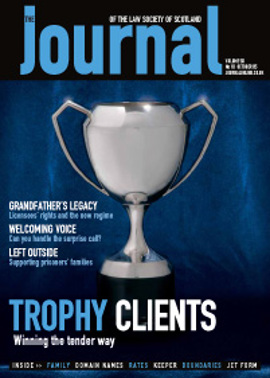Checks and balances

The role of non-solicitor reporters in the complaints handling system has never been more important. While they have had an input to the system for almost 20 years, their presence has been steadily growing during that period. They now make up 50% of the committee members who decide the outcome of complaints through the 12 complaints-related committees. Non-solicitors also sit on many other Society committees, such as Education and Training, and will soon be represented on the Society’s Council.
In short, more non-solicitors are involved in the Society’s work than ever before and most of that focuses on the complaints system. In addition to the committee members, there are more than 20 other non-solicitors who now prepare reports on complaints and even more are needed.
A changing scene
The mounting workload is part of the reason behind the need for more non-solicitor reporters, but so too is the changing nature of the complaints system. Much has been said and written about complaints handling in Scotland in recent years, not least by the Justice 1 Committee report in 2002 and the Scottish Executive consultation, “Reforming Complaints Handling, Building Consumer Confidence”, earlier this year. Perhaps less is said and written about how much change has taken place during the same period. Yet it is that process of reform which has created such a vital role for non-solicitor input, especially as reporters.
Anne Hastie is one non-solicitor reporter who is aware of that role – and she is keen to preserve it amid calls for an even more radical overhaul of the system. For instance, while reporters receive a nominal fee of £100 for every report completed and £50 for attending a committee meeting, the time-consuming work is essentially voluntary. For that reason alone, the costs involved in setting up an independent complaints handling body may prove prohibitive because the “voluntary contribution” crucial to the operation of the current system does not appear to have been taken into account.
In relation to the Executive’s consultation, Anne, who is manager of the Haddington citizens advice bureau (CAB), adds: “I have been impressed by the way the Society has embraced all the changes that have been introduced. They have worked really hard to try and make it better and easier for people to complain. But in increasing the numbers of lay reporters involved, making the system more transparent and faster, they have also made it more effective.
“Now the Society should be given a chance to develop what it is already doing. I thought the option it put forward for changing the structure of complaints handling [option E – a seven-point action plan which builds on the progress made by the current system] was a sound and entirely sensible suggestion.”
No closed shop
Anne, who has been a reporter since early last year, also sits both on one of the client relations committees, which have now been delegated powers to decide on complaints, and the Client Care Committee which, for instance, oversaw the introduction of client relations partners at every firm in Scotland.
She adds that it is also important to “dispel the perception that the complaints handling system is a closed shop”, emphasising that discussions in committees are rarely divided along solicitors/non-solicitors lines.
The interaction of solicitors and non-solicitors is a theme taken up by one of the longest serving reporters and committee members, Isabel Walkingshaw. Isabel, a former teacher, lecturer and health education officer, began as a non-solicitor reporter seven years ago and has seen many changes during that time.
She says: “The introduction of lay reporters was fairly new when I started and there was a polite acceptance of them at the time. Now, there would be discomfort from the solicitor members if they weren’t there; I believe they are now seen as something of value who contribute to the system.
“Because it is their profession, solicitors may be less able to appreciate how the work they do is viewed by the man in the street. That is where non-solicitors are of most value.
“Having said that, the harshest critics of solicitors are often solicitors themselves. It’s their profession and they don’t want fellow solicitors to let it down or bring it into disrepute. It’s not a question of solicitors looking after solicitors.”
Distorted perception
Isabel also has views on how the system might be changed in the future. She is particularly concerned that the rising number of complaints about endowment policies may be unfairly “distorting the impression of how complaints are handled”. Despite that, she says her involvement throughout this period of change has given her considerable satisfaction, not least because of her fundamental commitment to the principle of non-solicitor involvement in the complaints system.
Jenny McIntyre is another long-serving non-solicitor reporter and committee member. The former personnel manager is also one of the busiest reporters. She too recognises that the upsurge in endowment complaints has changed the nature of the work, with some committees now dominated by those alone.
“The Society gets criticised for the number of complaints, yet they are proactively trying to let people know how to complain if they are unhappy. The public are more likely to complain now and in a sense that’s good, although the media should concentrate on why that is the case rather than just criticising the Society for the number of complaints.”
Jenny, who is also a client relations committee member and sits on the sifting panel, adds: “When I started as a reporter, as a consumer-orientated person, I thought I would be quite shocked by the number of serious complaints. But I very quickly began to feel quite sorry for the lawyers and realised that a lot of people complain for the sake of complaining.
“But lay members have also had quite a big influence because we can see things from a different perspective, for instance in terms of communicating with clients.”
The importance of service
Kay Telfer, a former agricultural economist who started as a non-solicitor reporter in 1996, has also been heavily involved in a system which has seen so much change over the years.
Although no longer a reporter, she has dealt with complaints as a committee member and sat on the Client Care Committee. She also gave evidence to the Justice 1 Committee, which reported in 2002, about the role of non-solicitors. She is currently a member of the Professional Conduct Committee.
She agrees with Jenny McIntyre that today’s “consumer society” has demanded that the whole complaints system be speeded up and formalised. She says: “The other thing that has changed is that there’s now more stress on the service side of complaints rather than misconduct. In the past, some of the older solicitors in particular thought service was not something they should be concerned with – now virtually every solicitor realises that service is very important.”
But she adds that further change would only be introduced as a result of public perception rather than a pressing need for reform. She believes: “A separate complaints system would cost more and, in many ways, would be less effective. It would be better keeping it closer to the practising solicitors.”
Quality of work
Kay Telfer’s membership of many committees over the years indicates how the role of non-solicitors has widened over the years. Chris Fraser, a former chartered surveyor, is another who has held a number of positions since becoming a non-solicitor reporter seven years ago.
He stresses the value of increasing the number of client relations committees: “The recent addition of another two client relations committees, bringing the total number to 12, is a significant advance in the complaints handling system and a further indication of the Society’s forward thinking during the ongoing modernisation programme. This will allow committees to go with fewer agenda items and ensure a high quality of work.”
He also underlines the importance of non-solicitor input to the sifting panel, which can direct an investigation to be conducted into a complaint, and the Professional Conduct Committee, which decides which matters should be passed to the Scottish Solicitors’ Discipline Tribunal.
Craig Watson is a freelance writer specialising in legal affairs
WHAT HAVE YOU LEARNED FROM DOING THE WORK?
“I think that more than anything else it has raised the profile of my own organisation, CAB, among solicitors” – Anne Hastie
“An awful lot about the law and about how firms of solicitors work that I didn’t appreciate before” – Isabel Walkingshaw
“A lot about the public’s perception of lawyers – sometimes they are required to be social workers in that they have to listen to a lot that isn’t just day-to-day legal work” – Jenny McIntyre
“I have come to appreciate the meticulous work that solicitors do and also realise that you can have bad clients as well as bad solicitors” – Kay Telfer
“How solicitors operate and a good bit more about the law itself” – Chris Fraser
WOULD YOU RECOMMEND THE WORK TO OTHERS?
“Let’s put it this way, I have been asked if I am on commission because I keep putting people’s names forward” – Anne Hastie
“I would recommend it to others and already have done to a friend” – Isabel Walkingshaw
“I once put an article in The Herald saying that if people are interested in consumer affairs they should consider it because it’s very interesting, although also a heavy responsibility” – Jenny McIntyre
“Provided they had a genuine interest in people and were prepared to put in the hard work” – Kay Telfer
“I had an ex-colleague who has retired visiting me last week and I recommended it to him” – Chris Fraser
In this issue
- Back on the home front
- Exchanging the "missive"
- Perfect pitch
- Tales from the court
- The going rate
- Licence please
- "Your call is important to us..."
- Wake up to .eu
- Know your boundaries
- Outside in
- Checks and balances
- Policy and practice
- Supporting credentials
- Infrastructure: who pays?
- Protective awards unprotected
- Website reviews
- Book reviews
- New terms for old
- Keeper's corner






